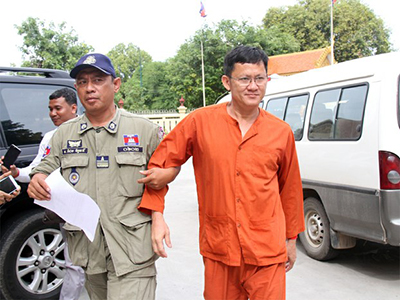




Cambodia’s top electoral body on Friday threatened legal action against any organization that conducts an opinion poll prior to upcoming local elections, prompting blowback from civil society groups who called the surveys key to fine-tuning political platforms for contending parties.
Speaking at a workshop on media preparation for the June 4 commune election, National Election Committee (NEC) spokesperson Hang Puthea said the NEC is in discussion with the Ministry of Information to release a statement legally banning opinion polls within a month of the ballot.
“[The decision] rests on regulations and legal procedures that we want to further stipulate in detail so as to ensure that even when there is election, Cambodia remains stable,” he told attendees.
Surveys predicting which political party will win the election “create confusion and chaos in society,” Hang Puthea said, adding that only the NEC is authorized to announce the official results of the vote.
“Past opinion polls caused an irregular environment in society,” he said.
“The NEC is paying great attention to preparations for the election and to ensuring that the daily lives of our citizens remain unaffected.”
Once the NEC issues its prohibition on opinion polls, any institution violating the ban “will face legal action,” Hang Puthea said, without elaborating on what punitive measures might be taken.
The NEC announcement followed an opinion poll recently published by local media that claimed the opposition Cambodia National Rescue Party (CNRP) would win up to 60 percent of commune chief positions up for grabs in this year’s election. Ruling Cambodian People’s Party (CPP) spokesperson Sok Ey San has called the survey “a trick meant to confuse public opinion and discredit the CPP.”
Pov Pisith, the deputy director-general of the Audiovisual Department under the Ministry of Information, who was also in attendance at Friday’s workshop, said the ministry will not permit the broadcast of any opinion poll prior to the election to avoid “social insecurity.”
“Each political party will have its own observers at all polling offices, so we will know who will win and who will lose because everything is transparent,” he said, suggesting there is no need for surveys ahead of the vote.
But Sam Kuntheamy, executive director of the civil society group Neutral and Impartial Committee for Free and Fair Elections in Cambodia (NICFEC), took issue with the idea that opinion polls foment chaos, instead calling them a crucial tool for parties in gauging how effective their political platforms are ahead of a vote.
“They help parties make further efforts [to refine their campaigns],” he told RFA’s Khmer Service.
“Any parties lacking support can further improve their political platforms so that they can attract more votes.”
Twelve political parties are competing for 1,646 commune council seats in the June 4 ballot that many see as a bellwether for general elections in 2018.
The CPP won more than 70 percent of the vote and secured 1,592 of 1,633 communes in Cambodia’s 2012 local elections, held before the CNRP was formed. The opposition party won nearly half of the vote in the general election the following year.
Observers say the CNRP could give the CPP, which has ruled Cambodia for more than 35 years, a run for its money in June, and the opposition has warned that the ruling party seeks to prevent it from standing in the elections through a variety of different measures.
The CNRP on Friday filed official documents informing the Ministry of Interior of amendments to its party by-laws after the ministry recently declared the opposition’s appointment of Kem Sokha as president illegitimate, throwing its participation in the upcoming election into question.
The ministry had claimed that the appointment during a March 2 extraordinary congress ran afoul of the CNRP’s statute, based on documentation the party filed in 2013, requiring a moratorium on electing a new president for 18 months after the post was vacated. The CNRP had amended the statute at the congress before appointing new leadership.
